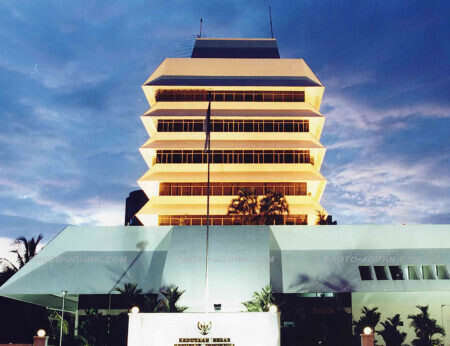Government officers at the Mataram immigration office are systematically skimming hundreds of millions of rupiah every week in tips, or uang terima kasih (thank you money), from issuing passports to Indonesians travelling to work overseas.
The long established and firmly entrenched practice is enabling immigration staff to live lifestyles and purchase assets that even a lifetime of salaries could never pay for on official Indonesian government salaries.
It is so blatant and the lifestyle of Mataram immigration staff so good that it is impossible that senior employees of the Kementerian Hukam dan Hak Asasi Manusia (Ministry of Law and Human Rights) and the Ministry of Labour and Manpower (Kementerian Ketenagakerjaan), which are both involved in the operation of regional Indonesian immigration offices, cannot be unaware of, if not direct beneficiaries of.
At the Mataram immigration office in Lombok, Nusa Tenggara Barat (West Nusa Tenggarra), the unofficial fees amount to some US$1 million per year. If applied to the plethora of class I and II immigration offices throughout Indonesia this figure could easily represent tens of millions of dollars a year from passport applications alone.
Passport scam puts spotlight on rogue immigration officers

It has long been a vexing question for many people as to how an Indonesian government employee on an income of less than Rp1.5 million per month can afford to pay cash for motor vehicles in the Rp100 to 300 million price range, houses in the tens of billions of rupiah category, or fund children studying at overseas universities.
It is not a question though that seems to overly disturb Indonesian government ministers, or three successive Indonesian presidents since the era of corruption, cronyism and nepotism (KKK) associated with the Suharto regime supposedly came to an end in 1995.
In fact, it is likely the practice of payments on top of officially prescribed fees is somewhat condoned, as it enables the Indonesian government to maintain a public service on what can only be described as minimal salaries.
A quick look in the parking lot of any Indonesian immigration office will see no shortage of expensive, gleaming motor vehicles owned by staff, while very few immigration staff of gold ranking live in squalor.
Cash paid for cars
One Indonesian immigration officer who previously worked at Jakarta’s Soekarno-Hatta International Airport (SHIA) prior to relocating to Lombok recently purchased a top of the line Australian made Hyundai RV for more than Rp330 million (about $30,000) and proudly boasted that he paid cash. This despite having an official salary of less than Rp1.5 million ($150.00) per month.
The passport scam by Indonesian immigration officials comes on top of one exposed last year by Media Indonesia alleging trillions of rupiah a year are being pilfered by immigration staff at SHIA who collect the Rp1 million (about $US100) fiscal payment Indonesian and Kitas (working visas held by foreign citizens) holders have to pay prior to leaving Indonesia.
Media Indonesia put the amount pilfered by Indonesian immigration staff in Jakarta alone at over Rp1 trillion (about $US10 million) per annum.
The Media Indonesia expose resulted in a swift response by Indonesia President Susillo Bambang Yudohyono (SBY), who ordered an immediate investigation into what was quickly dubbed the immigration fiscal mafia.
The Media Indonesia expose is only the tip of the iceberg. It focused solely on Jakarta and failed to look at other areas where immigration staff have the opportunity of skimming, or charging in excess of officially prescribed fees.
These include the collection of payments from tourists who overstay their allocated 30 day visitors permits, the renewal of monthly social and business visas, and the authorisation and issuing of temporary stay permist (Kitas) and retirement visas to foreigners.
It also ignored the practices at international airports and immigration offices at Surabaya, Bali, and Mataram to name a few, as well as at major sea departure points such as Batan in Sumatra, Tanjung Priok in Jakarta, and Tanjung Perak in Surabaya.
Kitas costs and penalties
It is well known that almost anyone can obtain an Indonesian Kitas if they want. The sponsoring company for the working visa might bare no relationship to the work the holder performs, however once the Kitas is issued very few, if any, questions are asked.
In Bali a new Kitas will cost a foreigner between Rp4 million and Rp6 million, while in Lombok a Kitas can cost up to Rp13 million depending on which agent is used. This is despite the official fee being set at less than Rp2 million.

Most foreigners living in Lombok and Bali use an agent to process their visa extensions. It’s no secret that a Rp50,000 to Rp100,000 tip is expected by Indonesian immigration staff in Mataram on top of the official processing fee of Rp200,000 per month.
Corruption in Indonesia involving the issue of Kitas is such that in Mataram, as well in other locations, it is often a sideline business of senior Indonesian immigration staff, or senior staff at the local office of Manpower who are the visa “sponsors”.
More than one foreigner has been caught out with submitting a monthly application late and been subjected to greatly inflated fees if they want their visas extended.
While stories among the Lombok expatriate community of exorbitant penalties being levied are numerous, none who claim to have paid these fees are able to produce receipts for the payments. Receipts are never issued.
The passport scam by Mataram immigration staff is fairly simple and crude, and because it involves only a dozen or so people is one that is easily controlled and concealed.
One of Indonesia’s largest exports is its people. Its burgeoning, under-educated, unskilled population is a steady and ready source of cheap labor for nearby Malaysia’s palm oil plantations, construction, and illicit sex industries.
Lured by the promise of salaries up to four times what they can earn at home, thousands of Indonesians each day are taken by immigration agents and employment brokers to line up at immigration offices around Indonesia and apply for passports.
At the Mataram immigration office in Lombok no fewer than a dozen employment brokers and immigration agents, as well as their staff, set up “shop” in the public waiting area each day where immigration offices provide them with an area in which to work to facilitate the processing of their clients’ applications.
Indonesia’s migrant labour dilemma

For many Indonesians the income and lifestyle in nearby Malaysia is so good that they don’t want to return when their 12 month working visas have expired.
During an amnesty ahead of stringent new punishment laws for illegal aliens in 2004, more than 120,000 Indonesians flocked to the Indonesian embassy in Kuala Lumpur in search of travel documents to return home.
The number of illegal Indonesians fearful of prison terms and caning was so great that the Indonesian government was forced to twice ask Malaysia to extend the deadline of the amnesty, with the Indonesian navy needing to be deployed to due to the number of people wishing to travel.
At Mataram‚immigration office staff regularly process between 300 and 500 passport applications a day.
During periods of peak demand this figure can easily swell to almost 800. The majority of applicants are from people brought from rural villages to the immigration office by employment brokers and immigration agents.
The official fee set by the Indonesian Government for a passport is Rp120,000 (about US$12.00), however, employment brokers and immigration agents in Mataram say they pay an additional Rp65,000 per passport as a tip for ensuring applications are processed promptly.
Mataram: up to $1 mln in “thank you tips”
At between 300 and 500 passports per day this equates to a “tip” to the tune of between Rp507 million to Rp845 million ($52,000 to $86,666) per month, or over Rp10 billion ($1 million) per year at the Mataram immigration office alone.
With a staff of only 44, the Mataram immigration office is typical of others around Indonesia.
With one international airport to service and up to 500 passport applications a day to process on top of visa extensions and new visa applications, its human and technological resources are stretched to the limit.
It’s not uncommon for staff to report for work at 8.00am and still be processing passport applications at 8.00pm.
More senior officials, or those working in other sections, regularly go home at 4.00pm and return at 8.00pm, working until the early hours of the morning approving applications and issuing passports.
It is also not unusual for billions of rupiah in cash to be removed from the office late at night or on Sunday‚ when the office is technically closed. Equally common is the practice of labour brokers and immigration agents collecting passports and submitting passport applications late at night.
At Rp65,000 bonus per passport, the unofficial “overtime rates”, especially for more senior staff, is well worth the extra hours. For junior staff the tips are not so good. They claim they only receive an additional Rp200,000 per month on top of their official salaries.
Just prior to the office closing for the main midday Friday prayers, a staff member will walk around the office and drop a Rp50,000 note on each workers desk.
Salary woes hound immigration officers

The shortage of staff also means that applications are not thoroughly examined prior to being approved. On more than one occasion a single individual was seen putting his fingerprints on up to 50 sets of fingerprint cards, which were then placed in the passport applications for 50 different people.
Photos that accompany passport applications are easily interchangeable between applications and it is not uncommon for the same person to apply for multiple passports in different names.
Employment brokers candidly acknowledge that many of the people applying for passports on a daily basis will never leave the country, while others will leave Indonesia with two or three passports in different names.
Each passport application also requires a medical certificate, though the brokers claim many of the checks are not as thorough as they could be. More than a few medically unfit people manage to obtain passports and overseas employment as a result, they say.
Until the beginning of 2006 the minimum salary for Indonesia’s public service staff (PNS) was a paltry Rp700,000 ($79) per month, rising to a little over Rp1,000,000 ($102) per month, and that for a mid level officer with perhaps 12-years service.
None but the most senior public servants earned more than Rp2 million ($141) a month.
Due to spiraling inflation of more than 10 per cent per annum (15.65 per cent in October 2006) which saw the price of benzine (gasoline) alone increase by more than 220 per cent in the last 10 months, minimum PNS salaries were increased by 42 per cent to Rp1 million per month at the start of the year.
38 cents per hour
On a salary of Rp1 million per month, a 12-hour day, five and a half days per week equates to an hourly rate of Rp3,788 ($0.38) or less.
A junior level immigration officer would therefore need to work more than 1.5 hours to buy a 12 stick packet of Indonesian cigarettes, or more than 6.5 hours to pay for a Big Mac, medium serve of french fries and a medium coke.
In comparison, the average salary for an Indonesian travelling to work in Malaysia is Rp900,000 ($91) per month. In addition they receive their meals and accommodation.
For many of those heading to Malaysia this is many times what they could ever expect to earn in Indonesia and many think that after a year or two of overseas work they will return home set for life.
For the employment brokers the “thank you money” is just another business cost and most accept the requirement to pay a little extra in return for speedy processing of their applications.
Brokers’ modus operandi
The brokers and agents themselves work in one of two ways. Some charge their clients a flat Rp1 million for all of the documents and processing of their passports and receive a commission of up to a further Rp1 million for each worker they send overseas.
A second method sees the local Indonesian agent pay for the medical examination (between Rp32,500 and Rp160,000), photocopying of necessary documents (Rp5,000), the passport (Rp185,000 including tip) and the fiscal fee on departure (Rp1 million). They then receive up to Rp1 million commission from the foreign employer once the worker commences employment.

A few Mataram employment agents spoken to while researching this story candidly admitted that like everything else in Indonesia, the fiscal payment was somewhat negotiable.
More than one agent or broker admitted that only about 50 to 60 per cent of the payments were receipted and in exchange for non-receipting the payments were cut from Rp1 million per person to between Rp600,000 and Rp700,000.
In either case the additional Rp65,000 demanded by immigration officials to provide a fast service is small change compared to the profits derived from sending 20 or 30 people a day to Malaysia.
Like most Indonesians, Mataram immigration office staff dislike the word korupsi (corruption) preferring to use words such uang persenen (tip), oleh oleh (gift or present) or uang terima kasih (thank you money) for “tips” received outside of official channels or in excess of prescribed fees.
However, when the tip becomes obligatory and not discretionary then the line between gratefulness and corruption has been well and truly crossed.
If Indonesian President Yudohyono is serious about cleaning house, the immigration department as a whole, and the office in Mataram in particular, would be a good place to start.
As too would be a requirement for all PNS staff and their spouses to compulsorily provide an annual statement of assets and their values.
One can’t help to think though that even President Yudohyono, with all of his talk of corruption busting, is not prepared to tackle the powerful Department of Immigration, or the PNS as a whole on this matter.
Feature photo John Le Fevre
Related:
- Gili Trawangan: a paradise lost *updated
- Death of maid in Malaysia highlights endemic foreign worker abuse (video)
- Sadistic Malaysian employer Yim Pek Ha jailed for 18-years for abusing maid out on bail
- Foreigners caned most in Malaysia (video)
He has spent extensive periods of time working in Africa and throughout Southeast Asia, with stints in the Middle East, the USA, and England.
He has covered major world events including Operation Desert Shield/ Storm, the 1991 pillage in Zaire, the 1994 Rwanda genocide, the 1999 East Timor independence unrest, the 2004 Asian tsunami, and the 2009, 2010, and 2014 Bangkok political protests.
In 1995 he was a Walkley Award finalist, the highest awards in Australian journalism, for his coverage of the 1995 Zaire (now Democratic Republic of Congo) Ebola outbreak.
Most recently he was the Thailand editor/ managing editor of AEC News Today . Prior to that he was the deputy editor and Thailand and Greater Mekong Sub-region editor for The Establishment Post, predecessor of Asean Today.
In the mid-80s and early 90s he owned JLF Promotions, the largest above and below the line marketing and PR firm servicing the high-technology industry in Australia. It was sold in 1995.
Opinions and views expressed on this site are those of the author’s only. Read more at About me
Latest posts by John Le Fevre (see all)
- Kaavan’s great escape photo special (video & gallery) – November 30, 2020
- A real life fairy tale: Cambodia provides sanctuary to Kaavan, the world’s loneliest elephant (video & gallery) *updated – November 30, 2020
- Death for corruption and press freedom abused as Thailand continues Nth Korean-like slide – July 23, 2015
- Thailand’s young rice farmers boost income, slash costs with switch to organic, AWD method – May 29, 2015


I am sure you can even buy citizenship under those conditions…
The Mataram imigrassi mafia sur know how to steal the local’s money and expat money but the chiefs in Jkarta also get their percentage from the racket in Lombok.
Thanks for reading,
You’re right. The Indonesian corruption chain is very well organized. Everyone knows their position in the chain and the appropriate amount is deducted from the total and the balance passed up to the next level, with each level responsible for the distribution of what it gets at a local level. Junior members of staff start receiving the “benefits” from day one, so the practice is indoctrinated and continues, with the entire system operating on trust in no one anywhere in the corruption chain not declaring what they get accurately. I’m sure there is also a quota that must be transferred up the chain each month or those responsible for an area or even office are redeployed.
The money trail I don’t think would be hard to find if anyone wanted to, but the chain goes very high in many departments, if not all the way to the top. Because of the way it operates it’s like the Greek mythological hydra. Lombok was, when I was there, particularly bad because of the number of foreigners staying long-term there and the Kantor Willaya.
Thanks for reading